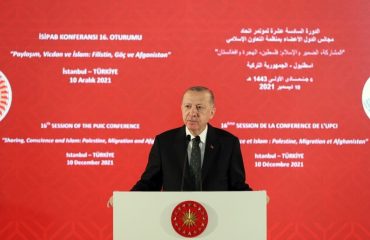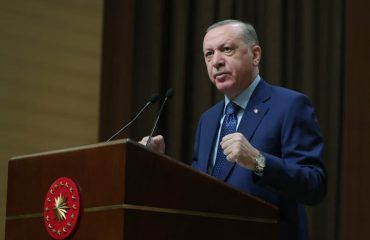

We live in a difficult time for democratic norms. Eighty-seven countries worldwide — home to an estimated 68% of the world’s population — are considered either electoral or closed autocracies. By contrast, the number of liberal democracies around the world has shrunk over the last 10 years, from 41 countries to 32. These startling numbers come from a 2021 report by Varieties of Democracy (V-Dem), a Sweden-based institute that is the largest-ever social science effort to measure democracy across the world.
According to the report, the average global citizen still lives under higher levels of democracy than in the 1970s and ‘80s, but that isn’t saying much. The last time things were this bad was around 1990, and the end of the Cold War at that time brought the United States opportunity to exert more influence and see more success in promoting democratic freedoms. Now, just three decades later, things have declined and the shine has worn off American democracy, tarnished by squandered opportunities and misused privilege. So what happened?
After 9/11, the U.S. embarked on generations-long wars in Afghanistan and Iraq, effectively closing the door on its era of “morally superior” soft power. While President Joe Biden and his predecessors have portrayed America as a leader on democracy and human rights, Washington’s European allies want the U.S. to be charged by the International Criminal Court for possible war crimes and crimes against humanity in Afghanistan. Others inquire — rightly — if it was necessary for more than a million Iraqis to die in the service of promoting democracy in Iraq after the claims that Saddam Hussein had chemical weapons and ties to Al Qaeda were proven wrong. Domestically, the Trump era brought out into the open the worst of America; the Jan. 6 riot at the U.S. Capitol showed definitively that American democracy is fragile. The Black Lives Matter movement, spurred on by the murder of George Floyd and other unarmed Black citizens by police — including Breonna Taylor, Philando Castile and Michael Dean — shows the U.S. record on human rights is hardly stellar either.
In short, everyone has fallen from grace. Democracy cannot be an effective tool of policy until those nations that promote it match their deeds to their words. “The old idea that there’s a set of countries called ‘established democracies’ that largely have solved their democratic problems and are working on the details, and then a set of countries, ‘new or struggling democracies,’ that are grappling with fundamental challenges – that old division is gone,” says Thomas Carothers, an expert on democratization at the Carnegie Endowment for International Peace. “Democracies all around the world are struggling with many of the same problems, and therefore the idea that there’s a ‘protected zone’ and a ‘struggling zone’ has to be removed from our minds. We have to think of democracy as a large terrain with a lot of similarities across the divisions that have existed in the past.”
Wall separating state and leader chipped away
The issue is the way “democratic” politicians use the power bestowed upon them by the electorate to serve their own interests. That any national leader would have an outsized sense of importance is understandable, but democratic norms erode when leaders act as though the state is an instrument of their personal power. The populist era has chipped away at the wall separating state and leader until there is no longer any distinction between the two. If there is a criticism about the leadership, it is mostly perceived against the state or country, and the extreme politicization we see all over the world has weakened the culture of democratization. Former President Trump portrayed himself as the victim of a stolen election by making it personal; his followers of course believed him, and the result was an insurrection that threatened the foundation of American democracy. This cycle proved that conspiracy theories thrive not only in Middle Eastern or Muslim nations; it can expand like a mushroom cloud (or a virus) in the most developed country of the world.
Civilian authority-military relations
What’s been more worrisome is the changing relationship between the civilian authority and the military – even in the capitals like Washington, D.C. and Paris. More than 200 retired U.S. generals and admirals endorsed Joe Biden because they believed that Trump’s authoritarian tendencies represented an existential threat to democracy. This was their way of standing up for democracy. Meanwhile, the letter published by members of the French military seemed to be advocating against democratic plurality and for French nationalism. Yet, regardless, retired or active military personnel on either side of the Atlantic revealed they – too – have been politicized and they – too – like their voice on political matters be heard by the public in a very untraditional style.
It is clear that the U.S. political system is about power, not about democracy in practice or even democratic ideals. It’s also personal. The “Catch-22” is that other power centers are rising in the world, and they resist U.S. hegemony. They don’t consider the U.S. a leader of good will, democracy, rule of law and human rights. Failure in American domestic and foreign policy surely cannot be the sole reason why autocracies are on the rise, but flawed U.S. leadership has certainly played a role.
“American political laboratory”
Biden’s approach in calling for a democracy summit later this year almost has no chance to make a difference because America has lost its credibility. Washington needs first to earn the trust bestowed upon it without wielding military or economic power like a cudgel. A more humble approach prioritizing cooperation and coordination could create a way forward. Demonizing Russia and China because they challenge U.S. global interests does not go over well in the rest of the world, where people view such “hardball” as political posturing rather than principled, value-oriented priority positioning.
The U.S. would do better to stop its efforts to promote democracy; they only create more problems. The coronavirus pandemic has taught the world about the stages of producing a vaccine. That same diligent process needs to be applied to policymaking, rather than turning the world into an American political laboratory.


